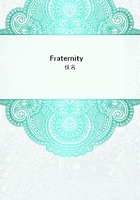
第37章
Nodding coolly, Martin motioned them aside. The shop was ten feet square; its counters, running parallel to two of the walls, were covered with plates of cake, sausages, old ham-bones, peppermint sweets, and household soap; there was also bread, margarine, suet in bowls, sugar, bloaters--many bloaters--Captain's biscuits, and other things besides. Two or three dead rabbits hung against the wall.
All was uncovered, so that what flies there were sat feeding socialistically. Behind the counter a girl of seventeen was serving a thin-faced woman with portions of a cheese which she was holding down with her strong, dirty hand, while she sawed it with a knife.
On the counter, next the cheese, sat a quiet-looking cat.
They all glanced round at the two young people, who stood and waited.
"Finish what you're at," said Martin, "then give me three pennyworth of bull's-eyes."The girl, with a violent effort, finished severing the cheese. The thin-faced woman took it, and, coughing above it, went away. The girl, who could not take her eyes off Thyme, now served them with three pennyworth of bull's-eyes, which she took out with her fingers, for they had stuck. Putting them in a screw of newspaper, she handed them to Martin. The young man, who had been observing negligently, touched Thyme's elbow. She, who had stood with eyes cast down, now turned. They went out, Martin handing the bull's-eyes to the little girl with an affection of the skin.
The street now ended in a wide road formed of little low houses.
"Black," said Martin, "here; all down this road-casual labour, criminals, loafers, drunkards, consumps. Look at the faces!"Thyme raised her eyes obediently. In this main thoroughfare it was not as in the by-street, and only dull or sullen glances, or none at all, were bent on her. Some of the houses had ragged plants on the window-sills; in one window a canary was singing. Then, at a bend, they came into a blacker reach of human river. Here were outbuildings, houses with broken windows, houses with windows boarded up, fried-fish shops, low public-houses, houses without doors. There were more men here than women, and those men were wheeling barrows full of rags and bottles, or not even full of rags and bottles; or they were standing by the public-houses gossiping or quarrelling in groups of three or four; or very slowly walking in the gutters, or on the pavements, as though trying to remember if they were alive. Then suddenly some young man with gaunt violence in his face would pass, pushing his barrow desperately, striding fiercely by. And every now and then, from a fried-fish or hardware shop, would come out a man in a dirty apron to take the sun and contemplate the scene, not finding in it, seemingly, anything that in any way depressed his spirit.
Amongst the constant, crawling, shifting stream of passengers were seen women carrying food wrapped up in newspaper, or with bundles beneath their shawls. The faces of these women were generally either very red and coarse or of a sort of bluish-white; they wore the expression of such as know themselves to be existing in the way that Providence has arranged they should exist. No surprise, revolt, dismay, or shame was ever to be seen on those faces; in place of these emotions a drab and brutish acquiescence or mechanical coarse jocularity. To pass like this about their business was their occupation each morning of the year; it was needful to accept it.
Not having any hope of ever, being different, not being able to imagine any other life, they were not so wasteful of their strength as to attempt either to hope or to imagine. Here and there, too, very slowly passed old men and women, crawling along, like winter bees who, in some strange and evil moment, had forgotten to die in the sunlight of their toil, and, too old to be of use, had been chivied forth from their hive to perish slowly in the cold twilight of their days.
Down the centre of the street Thyme saw a brewer's dray creeping its way due south under the sun. Three horses drew it, with braided tails and beribboned manes, the brass glittering on their harness.
High up, like a god, sat the drayman, his little slits of eyes above huge red cheeks fixed immovably on his horses' crests. Behind him, with slow, unceasing crunch, the dray rolled, piled up with hogsheads, whereon the drayman's mate lay sleeping. Like the slumbrous image of some mighty unrelenting Power, it passed, proud that its monstrous bulk contained all the joy and blessing those shadows on the pavement had ever known.
The two young people emerged on to the high road running east and west.
"Cross here," said Martin, "and cut down into Kensington. Nothing more of interest now till we get to Hound Street. Purceys and Purceys all round about this part."Thyme shook herself.
"O Martin, let's go down a road where there's some air. I feel so dirty." She put her hand up to her chest.
"There's one here," said Martin.
They turned to the left into a road that had many trees. Now that she could breathe and look about her, Thyme once more held her head erect and began to swing her arms.
"Martin, something must be done!"
The young doctor did not reply; his face still wore its pale, sarcastic, observant look. He gave her arm a squeeze with a half-contemptuous smile.